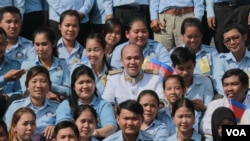While a new generation of ruling party leaders is assuming increasing influence in Cambodia, many believe the youth may not be given space to challenge the status quo.
Speaking to more than 100 people who had gathered at Johns Hopkins University’s US-Korea Institute at SAIS in January, Prime Minister Hun Sen’s youngest son, Hun Many, said the success or failure of the next generation of leaders rests not with a reliance on patronage networks, but rather showing the old guard they deserve the opportunity.
“For me I believe that it is also the responsibility of the youth ... to perform and create confidence by results-based performance, so that [the] old generation is able to really allow the process of transition,” he said at the time.
Despite being the son of the premier, he said his position as a member of parliament, where he currently represents Kampong Speu province, was not guaranteed.
“It’s a fact that regardless of [being] son of [the] prime minister or not son of [the] prime minister, if you cannot perform, nobody would care,” he said.
“That’s the fact. So many leaders in the world have children; if they don’t perform, people will not give recognition to that, because at the end of the day it’s the public who decide whether you’re worth something or not, not your last name.”
Many is seen as a rising star in the CPP, a position believed to be in no small part related to his familial ties to Hun Sen, who has ruled the country for over 30 years. For several years, younger CPP leaders such as Many, who also heads the party’s youth wing, have been traveling overseas with greater frequency to promote a positive image of Cambodia and garner support.
In November, a youth delegation led by Moeung Ponlik, a Royal Cambodian Armed Forces officer who heads the Cambodian Youth Movement, better known as Group 157, visited California. Hun Sen’s eldest son, Hun Manet, plans to tour the US and Canada this month.
Since the last election, in 2013, the CPP has promoted several fresh faces into the ministries and some have won seats in parliament. However, the opposition has criticised these moves as self-serving. The appointment of the children of senior party leaders, they say, such as those of Interior Minister Sar Kheng, Senate President Say Chhum, and Deputy Prime Minister Sok An, is evidence of this trend.
Analysts also warn that these moves are an attempt by the ruling party to prepare the next generation of leaders to perpetuate the CPP’s hold on power.
Cheang Sokha, executive director of Youth Resource Development Program, welcomed the emergence of new voices in both the CPP and opposition Cambodia National Rescue Party, which won 55 of the 123 seats in the National Assembly in 2013.
“We see that youth have been promoted into the party ranks, but the opportunity given to them to make a decision is still limited,” he said. “Therefore, we want to see youth’s full participation at the political level. Even though, it is within the party, they should be in a position where they can influence the process of making rules or policy for the party.”
The elections in 2013, which saw the CPP retain power amid widespread allegations of voter fraud, were a catalyst for this apparent growth in enthusiasm for political participation among the youth.
“Before it was like their participation was boosted by their feelings, but in the last stage they’ve turned to talk about political platforms and they monitor politicians’ activities,” he said. “I think this is good progress for the youth.”
Chak Sopheap, executive director of the Cambodian Center for Human Rights, expressed hope that political parties would offer more opportunities to young members to progress.
“I think that this should start from each political party,” she said. “What policy or mechanisms do they have in place for youth, women, and indigenous people? For instance, when they talk about a candidate, how do they encourage youth to participate? How do they ease the process for them?”
In his speech, Many did, however, acknowledge that within his own party there are those who oppose changes at any cost and are content to maintain the status quo.
“In any society, in any party, there is always the conservative and most conservative,” he said. “Some are really conservatives because they like the way things are done and some are just conservative because they don’t know whether the youth coming up are able to deliver.
“So there are two aspects of it and, of course, I’m not going to deny that. I think that’s the challenge we need to overcome.”





